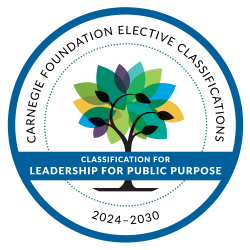To receive the Leadership minor, students will include as part of their portfolio a series of reflection papers pertaining to different requirements as specified in the program description and checklist. While students are encouraged to use this opportunity to demonstrate creativity and initiative, the Leadership Education and Service Committee also believes it has the responsibility to provide the student with certain guidelines to help meet the expectations. These are offered below. If the student has questions about the guidelines, s/he should discuss these with a faculty member affiliated with the Institute for Leadership Education.
In general, reflection papers should demonstrate the student’s skills of critical inquiry over a range of topics pertinent to the components of the minor requirements. We are often asked questions regarding the required length of these papers. While there is no standard, we generally see papers that are three to five pages in length, double-spaced. Having said this, the greater concern is with the content of the paper, not length. A complete and effective reflection paper will:
- demonstrate familiarity with the major leadership themes pertinent to your experience throughout the program and relate them to specific presentations, experiences, books, and articles.
- demonstrate your ability to write clearly and succinctly, and
- demonstrate critical thinking. This means you are accountable for what you write in terms of providing evidence and sound logic to support your comments. To effectively demonstrate your skills of critical inquiry,a. Be as explicit as you can in identifying the topic or theme about which you are writing,b. Explain how your topic or theme relates to leadership (be specific) and to Wartburg’s definition of leadership,c. Describe the process of learning through which your understanding of leadership was enhanced by this experience, and identify the kinds of learning you experienced.d. Identify what was most valuable about this experience, and what you would change if you had the opportunity to repeat this activity.e. Explain how this particular experience relates to other experiences you have had relative to the leadership program.

